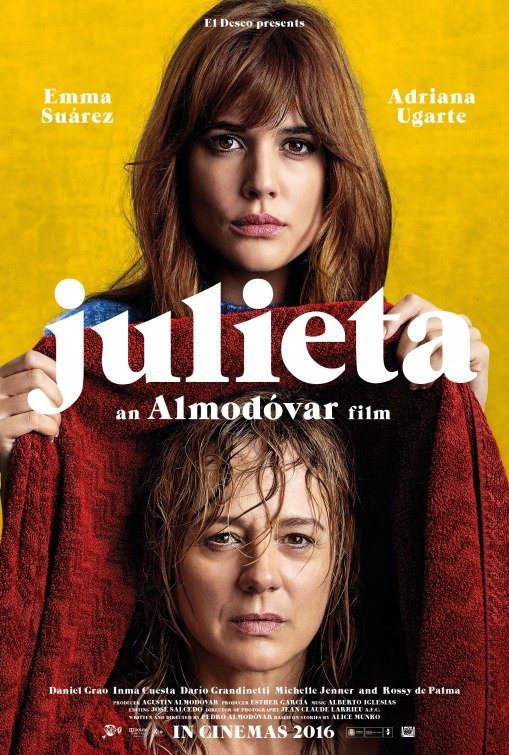“Overcoming Guilt, Pain and Separation”

| None | Light | Moderate | Heavy | |
|---|---|---|---|---|
| Language | ||||
| Violence | ||||
| Sex | ||||
| Nudity |
What You Need To Know:
JULIETA is an emotional melodrama about tragedy, pain, loss, abandonment, and the love a mother has for a daughter. As such, it’s one of Director Pedro Almodóvar’s more effective movies. It’s less political than his earlier movies, although there is a politically correct, anti-religious element in several lines. Eventually, the tragic situation between mother and daughter ends in a happy, but bittersweet, resolution. However, MOVIEGUIDE® advises very extreme caution for JULIETA, mostly because of some scenes of immoral, extra-marital sex.
Content:
(B, RoRo, PC, AB, Ho, L, V, SS, NN, A, D, MM) Light moral worldview about the lost connection between a mother and a daughter, which is eventually regained at the very end, marred by some strong Romantic elements, plus there’s a light politically correct element when it’s suggested in a couple lines of dialogue that a woman at one point became a religious “fanatic” after feeling shame concerning a lesbian obsession with a female teenage friend; one “h” obscenity and one light profanity; violence includes a train suddenly stops when a man commits suicide off screen in front of a train, bag hits woman’s head when train suddenly stops, cups fall and break when train suddenly stops, a female pedestrian accidentally hits side of moving car, and she later is shown in the hospital with a black right eye, woman writes to her estranged mother her son has accidentally drowned, and man dies off screen during sudden storm when he’s fishing in his boat off shore; one scene of depicted adulterous sex fornication between unmarried woman and married man whose wife has been in a coma for several years, two scenes of depicted fornication after man’s wife dies, title character visits her invalid mother and father and sees her father kissing the younger servant woman, man admits to common law wife that 10 years when she was away he slept with an old girlfriend, and a couple scenes of implied fornication, plus it’s suggested married man had an affair with another woman after his wife lay in a coma for a long time; upper female nudity in two sex scenes, rear female nudity as woman sleeps in bed after implied fornication, woman in bra during another implied sex scene, and images of upper male nudity; alcohol use; smoking but no drugs; and, female servant resents her master’s girlfriend/common law wife and gossips, classical literature teacher tells myth about the “gods” creating men out of fire and clay, woman plans to move from Spain to Portugal to be with her boyfriend but changes her mind, woman hides truth from her daughter, and woman gets pregnant out of wedlock but ends up staying with the father until he dies accidentally 13 years later.
More Detail:
The movie opens with Julieta preparing to move from Madrid to Portugal with her boyfriend, Lorenzo. However, she runs into a childhood friend of her daughter, who tells Julieta she saw her daughter recently in Italy. Julieta’s daughter, Antía, had severed all ties with her mother years ago.
Julieta decides to part with Lorenzo and stay in Madrid, so that Antía can find her more easily, in hopes of re-establishing contact with her daughter. She even returns to live in her old apartment in Madrid. As Julieta does that, she has memory flashbacks showing how Antía came to be born, what happened to the father, and how and why Antía suddenly decided to break off any relationship with her mother. This encounter with the past creates feelings of guilt and abandonment in Julieta.
JULIETA is an emotional drama about tragedy, pain, loss, abandonment, and the love a mother has for a daughter. As such, it’s one of Pedro Almodóvar’s more effective movies. It’s also less political than his earlier movies, although there is a politically correct, implied antagonism toward religion in a couple lines referencing a possible lesbian relationship. The music is striking. It’s reminiscent of a Hitchcock thriller. In fact, in one scene, a character makes a reference to the thriller novels of Patricia Highsmith, author of the novel behind Hitchcock’s STRANGERS ON A TRAIN (Julieta actually meets her daughter’s father on an evening train, where Julieta speaks briefly to an older man who later commits suicide off screen by stepping in front of the train).
Ultimately [SPOILER FOLLOWS], the movie reveals that the daughter separated from Julieta because she learned that, the day of her father’s death, Julieta had an argument with him. Julieta angrily went for a walk, so the father went fishing on his boat. Sadly, a terrible storm kicked up, and the father died when the storm sank his boat. In a letter to her daughter about this tragedy, Julieta admits, “I was suffocated by a tremendous sense of guilt about your father’s death. . . . I never talked to you about it. I wanted you to grow up free from guilt, but you sensed it. And despite my silence, I infected you like a virus.” This tragic situation ends in a happy, but bittersweet, resolution at the end. So, there is eventually hope that Julieta and her daughter will reconcile.
Julieta’s love for her daughter and the hopeful ending give JULIETA a positive worldview, despite some Romantic elements. That said, MOVIEGUIDE® advises very extreme caution for JULIETA, mostly because of the movie’s extra-marital sex scenes, which contain brief nudity.


 - Content:
- Content: 

